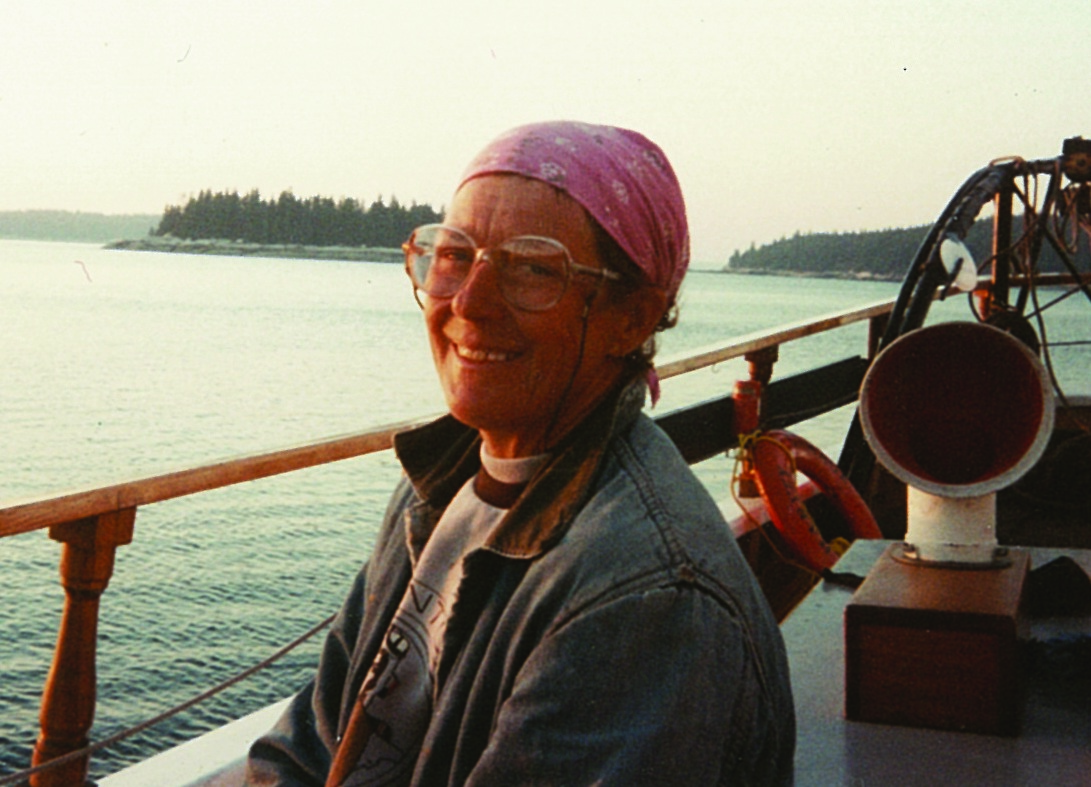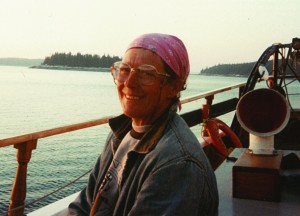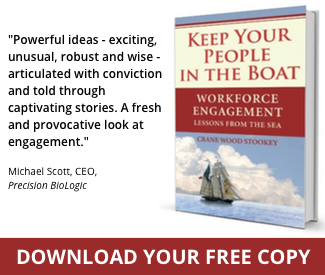I owe my sailing career to Ellen. My first job on a sailing ship was as Chief Mate, second in command. First job? And I was Mate? What sense does that make? I think I managed to get hired as Chief Mate because they were short for crew that year and I already had a captain’s license. Never mind that it was the lowest grade motorboat license you could get, limited to lakes and harbours, and that I had not yet used it professionally, or even set foot on a large sailing ship before. I had a license, so I was Chief Mate.
But my ignorance was mortifying, and the captain was appalled that I had been hired. The rest of the crew consisted of two college kids who didn’t know up, an amateur naval historian who thought he knew everything, a revolving lineup of cooks aspiring to be sailors, none of whom lasted very long, and Ellen, age 54, who had retired early from her job to fulfill her dream of going to sea.
Thank goodness for Ellen. She had already been crewing on schooners for about three years. She was endlessly patient and generous in training the rest of the crew, including me, who was supposed to be her boss.
I’d sailed all my life, and had been working for a few years teaching sailing and coastal cruising and running charter boats in San Francisco. But this ship was 130 feet long, carrying 5,000 square feet of sail. I was out of my league. I literally did not know the first thing about sailing a large traditional ship.
Ellen taught me everything, including not to call the captain “Skipper,” a term that identified me as a landlubber who watched Gilligan’s Island. In the myriad tasks and skills and protocols that a sailing ship demands, Ellen showed me how things should be done.
The captain told me what to do too, but at the start at least I resisted learning from him. I was intimidated by his disapproval, and painfully aware that he didn’t respect or trust me. This might have spurred me on to do my best, to show that I could meet his expectations, but instead it had the effect of spurring me to avoid contact with him as much as possible, especially if it might lead to any correction of my performance by him. Our relationship devolved into two intractable roles: the demanding, irascible Captain and the resentful, slacker Mate.
You might not think that my pose of resentful slacker helped me much, since it endlessly attracted the captain’s anger. But it also allowed me to deflect that anger by saying to myself, “I’m not giving this guy the satisfaction of meeting his demands. He can’t make me hop.”
I don’t defend my behaviour. I was not doing my job of setting a good example for the crew. I had a lot to learn at that point about hard work, and in the end I learned a lot about it from the captain. But it was Ellen who taught me not only the skills of the schoonerman, but also the delight of the job.
She too might have been expected to assume some kind of pose to protect her rather vulnerable position of old lady trying to be an old salt in a crew of people nearly half her age. But she didn’t seem to be burdened with that kind of baggage. She loved being a sailor on a traditional ship, and she was happy to share that love with the rest of us.
Engagement is a state of mind. One of the fruits of good leadership is an engaged and effective state of mind, a big view, in the people we lead. Ellen inspired something of this bigger state of mind in me, because she possessed it herself, and she was generous enough to make it the basis of her relationship with all of us in the crew. She could teach me the hard skills of course, but the captain could too. It wasn’t Ellen’s seamanship that allowed her to engage me more effectively than the captain. It was her generous willingness to share her own joy in the work, and invite me in with her. She led me to relax about myself, loosen my grip on my struggle, and step out of my limiting self-protection into the big, glorious world of schooner work.
Leadership can come from anywhere, and it can flow up the hierarchy as well as down, as long as it comes naturally. Great leadership can come from the natural delight one person is willing to share with another. This is the leadership lesson I learned from Ellen. Cultivating our emotional generosity is a key leadership skill that most of us don’t work on anywhere near hard enough.





Hi Crane
It has been awhile, hope all is well.
I enjoyed the article and I do think “Generous Leader” is appropriate.
Been very busy, lol.
Terry
Hi Terry, Yes, been too long. Time for me to take you to lunch and hear the news. Have a great Easter.